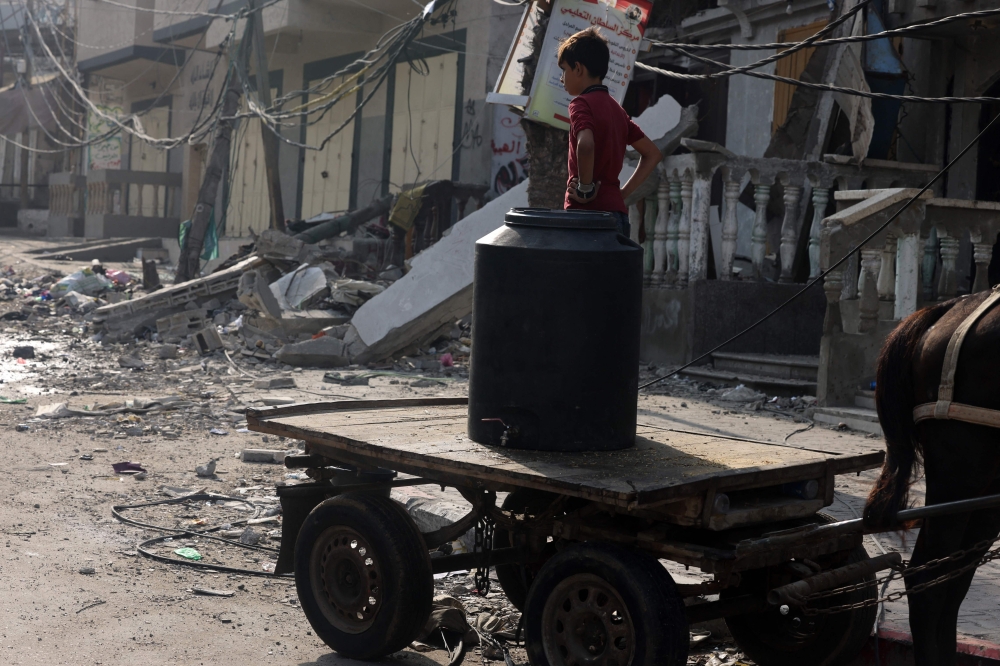PALESTINIAN TERRITORIES, Oct 28 — After air strikes and artillery fire rained down for hours overnight, much of the Gaza Strip has become an indistinguishable wasteland of rubble, with residents likening the devastation to that of a natural disaster.
The intense bombardments “changed the landscape”, Mahmud Bassal, a spokesman for the Gaza Civil Defence told AFP of the damage.
“Hundreds of buildings and houses were completely destroyed and thousands of other homes were damaged,” he added.
The destruction followed an announcement from the Israeli military that its forces had expanded operations in Gaza, following three weeks of intense bombardments in the wake of the October 7 attacks by Hamas in southern Israel.
More than 7,700 people have since been killed in retaliatory Israeli strikes on the Gaza Strip, including some 3,500 children, according to the territory’s health ministry.
They came after Hamas fighters crossed the heavily fortified border to southern Israel, killing some 1,400 people, mostly civilians, according to Israeli officials.
The Islamist group has also taken some 229 people to the Gaza Strip as captives, according to the army.
Just hours before Israel intensified its bombardment last night, army spokesman Daniel Hagari accused Hamas fighters of waging war on Israel from Gaza’s hospitals and using civilians as “human shields”.
In Shati refugee camp on the outskirts of Gaza City, widespread damage was visible.
“What happened in Shati is worse than an earthquake,” camp resident Alaa Mahdi, 51, told AFP.
“There was bombing from everywhere, the navy, artillery and the planes,” he continued.
“Who are they striking, the resistance? No, the poor people.”
Mahdi said the internet and communications blackout in the Gaza Strip since yesterday evening had been imposed so that Israel “would commit a massacre without anyone hearing about it”.
The blackout triggered condemnation from a range of rights groups.
“This information blackout risks providing cover for mass atrocities and contributing to impunity for human rights violations,” said Human Rights Watch in a statement.

‘Is Anybody There?’
“Last night, the ground in Gaza shook,” Israeli Defence Minister Yoav Gallant declared today. “We attacked above the ground and below the ground. We attacked terror operatives of all ranks in every location.”
Amid the onslaught, taxi driver Jamal Abu Shaqfa, 50, left the Shati camp with his family in a bid to flee south.
“We are heading towards Khan Yunis because the indiscriminate bombings in Shati have spared no women, children or old people,” he said.
“The situation is very bad.”
Amid a humanitarian situation described by world organisations as “catastrophic”, a food rations distribution centre run by the UN agency for Palestinian refugees was looted.
Dozens of Palestinians were seen coming out of the premises in Deir al-Balah in central Gaza, one carrying a sack of flour on his shoulder, another bottles of oil under his arm.
“If we weren’t in need, we wouldn’t have gone in. The whole world is against us,” said one as he left the centre.
In a street in the camp, dozens of residents picked through the debris of a residential tower that along with several houses nearby was razed by the bombing.
“Is anybody there? We are here to save you,” shouted Abdelmajid Abu Hassira, as he waded through the wreckage searching for survivors.
Kamal Abou Fattoum, 47, who fled south from Gaza City last week, returned on Saturday morning to find his house reduced to debris.
“I saw destruction worse than that caused by the earthquake in Turkey,” he said, referring to the devastating natural disaster in February that killed more than 50,000 people in southeastern Turkey.
“People are under the rubble. Some are dead, others are still alive,” he added. — AFP






















